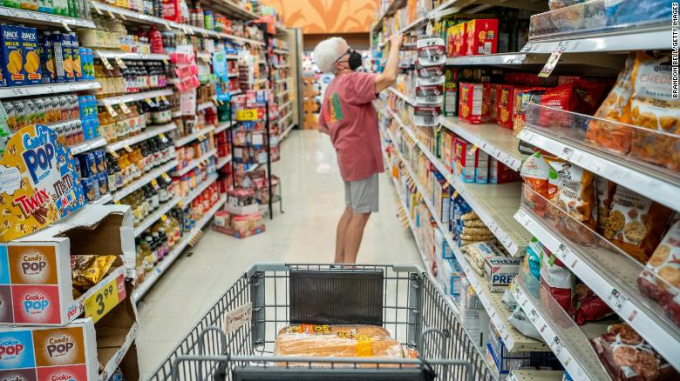November 27, 2025 | 17:18 GMT +7
November 27, 2025 | 17:18 GMT +7
Hotline: 0913.378.918
November 27, 2025 | 17:18 GMT +7
Hotline: 0913.378.918

Grocery items are still going up.
Over the last 12 months, grocery prices soared 13.1% — the largest annual increase since the year ending in March 1979, the Bureau of Labor Statistics said Wednesday.
The prices of nearly every grocery item have ballooned over the past year.
The cost of eggs has soared 38%, and prices for other goods have also jumped: Flour is up 22.7%, chicken 17.6%, milk 15.6%, ground beef 9.7% and bacon 9.2%. Fruits and vegetables got 9.3% more expensive.
A number of factors have contributed to the rise in food costs: A deadly avian flu has meant fewer eggs in the United States, a severe drought in Brazil slashed coffee crops and the war in Ukraine led to a spike in wheat prices in the spring.
While commodity prices are falling, it will take time before those lower costs pass through to consumers. Plus, plenty of other costs for producers — such as fuel, labor and packaging — have also been high.
And as supply has been disrupted, demand has grown.
Demand for groceries grows
Unlike discretionary items, consumers can't simply stop buying food when prices rise. They may, however, opt for less expensive options. Producers, grocers and restaurant operators have noted that consumers are indeed trading down — swapping out higher-priced items for more affordable ones.
Earlier this week, Tyson (TSN)said demand for steak is falling while interest in chicken is rising. Wendy's (WEN) traffic has been hit because some customers are deciding to pack lunches or eat breakfast at home, CEO Todd Penegor said during a post-earnings analyst call Wednesday.
Penegor added that about 82% of meals were eaten at home pre-pandemic, but that figure jumped three percentage points since then and has stayed there.
"The consumer has been a little more strapped, so there's a few more meals prepared at home," Penegor said. "Inflation has been high, so net disposable income has been a little bit pinched."
Restaurants have also been raising prices, but at a slower clip: In the 12-month period through July, menu prices rose 7.6%, less than overall inflation.
Plus, food prices are largely unaffected by current government efforts to curtail spiraling costs.
Federal Reserve Chair Jerome Powell acknowledged as much during a Senate Banking Committee hearing in June, saying that raising interest rates to fight inflation wouldn't lower food prices.
The Fed believes that "food and energy are influenced by global commodity prices in a way that tells them, 'Hey, these items aren't really directly under your control,'" noted Michael Gapen, head of US economics at Bank of America Global Research.
Essentially, the thinking is this: Because the US can't control international factors such as the war in Ukraine and higher shipping costs, it can't fully control domestic food prices.
What's more, the US government doesn't have a stockpile of food as it does of oil, noted Rob Fox, director of the knowledge exchange division at CoBank, which provides financial services to agribusinesses.
"There's no ability for the government to release extra stalks of wheat and corn and cheese and so on," Fox said.
What got more expensive in June
The result has been steadily higher prices in the grocery aisle, with some items seeing larger month over month spikes than others.
In July, adjusted for seasonal swings, egg prices popped 4.3% compared to June. Coffee and peanut butter each got 3.5% more expensive. Flour rose 3.2% and bread prices went up 2.8%. Cheese jumped 2%, while chicken got 1.4% pricier.
There was some relief, however. Citrus fell 3.2%, and whole milk dropped 1.4%. Uncooked beef roasts fell 1.3%, and uncooked steaks fell 1.1%. Ham got 1% cheaper.
The biggest decline was in hot dog prices, which dropped 6.1%.
(CNN)

(VAN) A new study reveals how the simultaneous effects of ocean acidification, salinity and loss of oxygen are making the world more fragile.

(VAN) Hopes are growing that the creation of the first 3D turkey gut model could be a turning point in the battle against the virulent blackhead disease.

(VAN) Tyson, America’s biggest meat supplier, plans to shutter one of its largest beef processing plants as the industry continues to struggle with low cattle supplies and political pressure from Washington.

(VAN) New FAO study shows how digital solutions are empowering farmers and fishers to prevent losses and build resilient agrifood systems.

(VAN) Brazil's COP30 presidency pushed through a compromise climate deal on Saturday that would boost finance for poor nations coping with global warming but that omitted any mention of the fossil fuels driving it.

(VAN) Poultry farmers in the UK have been warned that they could face one of the worst winters yet for bird flu.

(VAN) Prices of main-crop paddy have risen sharply, with jasmine rice hitting 16,100 baht per tonne — the highest level in years.